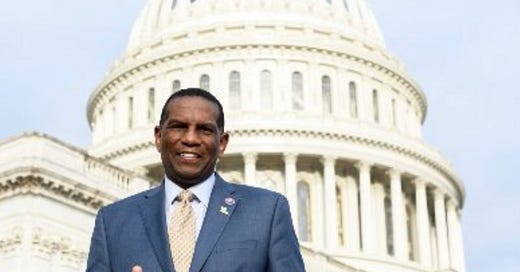Congressman Burgess Owens Pushes to Codify Trump’s Education Reforms: A Game-Changer for School Choice
Congressman Burgess Owens discusses efforts to codify key executive orders from President Trump, particularly focusing on education reforms. Owens emphasizes the importance of securing these changes through legislation, as executive orders can be easily reversed by future administrations. He highlights the passage of laws like those banning men from competing in women’s sports and efforts to combat "wokeness" in educational accreditation through the ACE Act.
Owens is optimistic about the potential to push through these reforms, especially given the Republican trifecta of the House, Senate, and White House. He also speaks about the Educational Choice for Children’s Act, a pivotal bill that would provide school choice options for every child in America, allowing parents to select from a range of educational institutions without federal or state interference. Owens believes this legislation will introduce much-needed competition into the education system, mirroring what is seen in other industries, and ensuring that the best educational options rise to the top. He is hopeful about advancing this bill through Congress soon.
Transcript
Chuck Warren: Donald Trump has done a bunch of executive orders. The problem of executive orders, the next president can get rid of the executive order and give a new one. So you're spearheading some efforts to codify his executive orders on education. Can you tell us a little bit about how that's going?
And you're optimistic that getting it through the House and gets through the Senate for Donald Trump's signature.
Congressman Burgess Owens: Yes, the miracle of where we are is we have something called a trifecta. That in itself is a miracle that we have the House, the Senate, and President Trump. But here's the other piece that might not be known, is that the last three terms I've been in place, we've had more America First legislators come into the plate.
So we have not only the ability to put things through, but the America first, which means we're gonna listen and follow our leader. We're gonna look at the vision that President Trump has and make sure we can back him up. So yes, the executive branch is a lot quicker. They can do things in a much faster way.
We're a little bit more, it takes a little bit longer, sometimes years to get things done. And then the Senate is even slower than we are. So what we wanna do is have a leader that we can then codify what he's putting in place. We have something, he just put an executive order
saying that men cannot compete in girls sports. Well, we just codified that. We put that in law. We're looking at something called the ACE Act, in which accreditation, you cannot put wokeness into accreditors and accreditation. Well, he did an executive order. We're now putting through an ACE Act. We just went to the House.
We're going to codify that. So we have a leader that gives an idea of what the future can be and what we have to hold on to. And we understand now that if we don't codify, we don't put this in law, then you're right, the next president will come along and change it all around,
and we don't want that to happen. So we're in tune, and I'm excited about, again, working with the president to get this done.
Sam Stone: One of the challenges you face in doing that, obviously, is working through the Senate where we don't have 60 votes to just move an agenda. And they can move a certain limited number of items or issues as part of a procedure, be able to do it with 50 plus, you know, 51 votes. What's the one bill?
They need to include 100% in that package. And what's the one bill that you think is most important that, hey, we should and can get 60 votes on that one?
Congressman Burgess Owens: Oh, boy. Well, first of all, thanks for that. That's a softball for me because that's one reason I'm here, guys. It's about education. We have an opportunity called reconciliation, and this is where we can put things in place that helps our country, moves us forward without having a 60-vote margin.
We have something called the Educational Choice for Children's Act, which I think is the most consequential legislative process we have in our country. It gives every child in our country a chance to have a choice in schools. And it doesn't take anything away from the local school districts.
There's no oversight by the federal or state because it's a nonprofit. But what happens is individuals and corporations have a chance to invest to give to nonprofits, to get a tax credit, and parents can choose any school they want to, public, private, parochial, homeschool, trade, whatever they want. And that competition, that ability to look at merit,
is going to finally get our education in a place that every other industry is. We need to have a matrix of merit. And education has been the only place that we have not had that competition. Now we're going to get it. And the best of the best will rise,
and the parents will actually send their kids to what works out for their child. So I'm excited about that piece of legislation, and we're hoping to get it through this coming week, coming up for sure.
Listen to the full episode of Breaking Battlegrounds anywhere you stream your podcasts!



